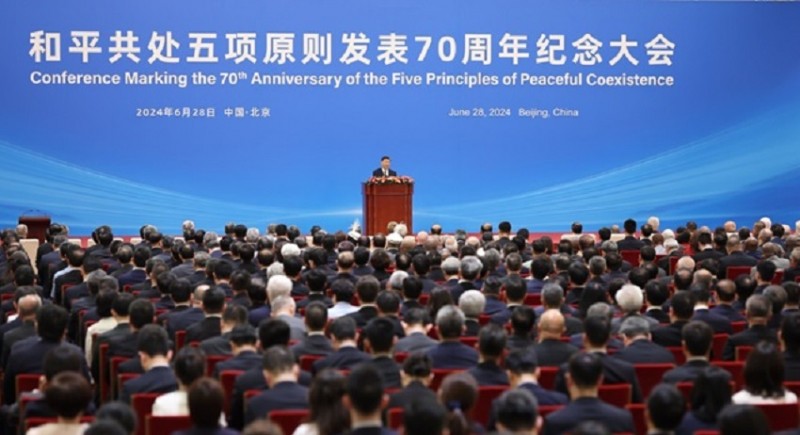
Chinese President Xi Jinping emphasized the importance of the Five Principles of Peaceful Coexistence for solving today's global conflicts. Speaking at an event marking the 70th anniversary of Panchsheel, Xi highlighted China's goal to increase its influence in the Global South amidst ongoing disputes with Western countries.
The Five Principles, which were first established in a 1954 agreement between Tibet and India, are foundational to international relations, according to Xi. He noted their historic adoption by the Non-Aligned Movement in the 1960s and their alignment with the UN Charter, presenting them as vital for global harmony.
Xi also introduced the Global Security Initiative to promote a shared future for humanity. He announced the creation of a Global South Research Centre and various educational programs, including scholarships and training opportunities, to support South-South cooperation over the next five years.
He stated that the Five Principles emerged as a response to the post-World War II era, marked by national independence movements and the collapse of colonial systems. Amid Cold War tensions, newly independent countries sought to protect their sovereignty and build their economies. China, committed to independence, actively pursued peaceful coexistence and improved its relations with neighboring countries. The Five Principles were first fully specified by Chinese leadership, including mutual respect for sovereignty and territorial integrity, mutual non-aggression, non-interference in each other’s internal affairs, equality, mutual benefit, and peaceful coexistence. They were incorporated into joint statements with India and Myanmar, advocating these principles as norms for international relations.
Although originating in Asia, the Five Principles quickly gained global acceptance. At the 1955 Bandung Conference, over 20 Asian and African countries proposed ten principles for state-to-state relations based on these Five Principles, promoting solidarity, friendship, and cooperation. The Non-Aligned Movement in the 1960s adopted them as guiding principles. They were endorsed in key international documents, including the 1970 UN Declaration on Principles of International Law and the 1974 Declaration on the Establishment of a New International Economic Order, gaining broad recognition.
Over the past 70 years, the Five Principles have shown enduring relevance, becoming open, inclusive, and universally accepted norms for international relations and fundamental principles of international law. They have made significant contributions to human progress.
Firstly, the Five Principles have set a historic benchmark for international relations and international law, aligning with the UN Charter and the evolving trends in international relations, highlighting mutuality and equality in state-to-state relations, and stressing the interrelation of rights, obligations, and responsibilities of all countries.
Secondly, they have guided the establishment and development of relations between countries with different social systems, promoting mutual trust, friendship, and cooperation, and offering a path for peaceful settlement of international disputes.
Thirdly, the Five Principles have encouraged developing countries to pursue cooperation and unity, inspiring countries in Asia, Africa, and Latin America to support each other, stand against foreign interference, and pursue independent development, boosting South-South cooperation and improving North-South relations.
Lastly, the Five Principles have contributed wisdom to reforming the international order, opposing imperialism, colonialism, and hegemonism, and laying a foundation for a more just and equitable international order.
Reflecting on their 70-year journey, Xi emphasized the importance of valuing, inheriting, and promoting the Five Principles, paying tribute to the leaders who initiated them and the visionaries who have upheld them.